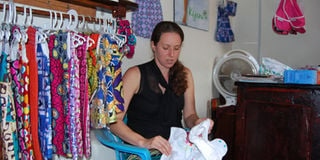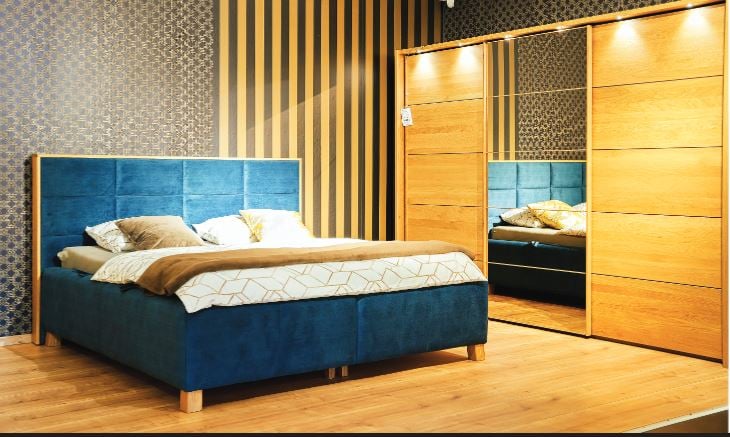Prime
Reusable diapers to reduce expenses and make money

Muigai demonstrates how the diapers are used. Photo by Gillian Nantume.
What you need to know:
HOME SOLUTIONS. The attendant costs attached to having a baby such as buying pampers, are what drove Valerie Muigai, 35, into learning how to sew reusable diapers.
As a mother with a toddler, have you ever sat down to calculate the amount of money you spend on pampers in a year? Let us assume you use two pampers in a day and each pamper costs Shs1,000. Roughly, in a year, you will have spent Shs730,000 on pampers. If your baby uses twice the amount in a year, then that is Shs1,460,000 in two years.
The attendant costs attached to having a baby (including buying pampers) are what drove Valerie Muigai, 35, into learning how to sew reusable diapers.
“Eight years ago, we were expecting our first child,” she explains, adding, “My husband was about to start graduate school. We were living in USA and we needed to find ways to save money. I discovered re-washable diapers on the Internet and I used them on my daughter.”
The couple’s friends also gifted them with reusable diapers to supplement what they had bought. At the end of the day, taking care of the baby’s sanitary needs was not as expensive as they imagined it would be.
“As my daughter grew older, a friend taught me how to sew my own diapers. When we moved to Uganda, I continued sewing the diapers as gifts to my friends. Their friends would see them and admire them, asking if I could sew just a few for them. That is how I started getting orders to make reusable diapers.”
Turning an advantage into a business
Soon, Muigai realised she could not handle the bulk sewing and neither did she have the time for it. She set up a small workshop in her house and trained some Ugandan women to make the diapers.
“In May 2016, the workshop moved out of my house to a flat we hired. It is a small company we called Kijani – which means ‘green’ in Swahili. It has only four tailors, but cloth diapers are catching on in the public.”
The diapers are sold on a retail basis and in November 2015, the company celebrated selling its 1,000th diaper. Today, they are close to hitting the 2,000th mark.
The diapers are in two parts; cover (pantie) and soaker. To cater for all people, some diapers are sold at Shs35,000 while others go for Shs25,000. You may buy four diapers and maybe, three extra soakers for each diaper. A lone soaker goes for Shs9,000.
The initial price is a little high but Muigai puts it down to the cost of materials. “For a good quality diaper you need specific materials. We import all our materials and they are the same materials you will find in diapers in Europe and North America. They are made from both cotton and laminated polyester.”
On the brighter side, despite the initial cost, a reusable diaper can last three to four years, so you can use them on more than one baby. The cover can be used two to three times before it can be washed, meaning only the soakers are changed after six to seven hours.
For variety, the diapers are made in different colours and sizes and can be adjusted to fit small babies.
The benefits of reusable diapers
Muigai, who has used her own diapers on her three children, says they helped her when one of her babies suffered from eczema.
“My second child suffered from a bad case of the skin condition and pampers worsened it. Since I was sure of the cotton in the diapers, I used them on him, together with a baby cream I had made, and his condition got better.”
Many mothers face a challenge when it comes to disposing used pampers. Some homes do not have pit latrines so they resort to burning them or throwing them on rubbish heaps. With reusable diapers, the challenge of disposal is minimal because they can be washed.
Also, as long as the diapers are allowed to air-dry well after washing, there is no chance of them giving off a foul smell.
Other products made
Besides diapers, Muigai’s company makes washable wipes, nappy rash creams, waterproof baby bags, baby clothes from African fabric imported from Kenya, and baby sleeping bags. Muigai personally mixes the creams from sheer butter and essential oils. The sleeping bags can be used from the time a child is born to two years. They cost between Shs50,000 and Shs95,000.
“We also make diapers for special-needs children and adults with spinal cord injuries or the elderly. These are made on custom order only. Complete diapers range from Shs45,000 to Shs70,000.”
Future plans
Five years from now, Kijani will have expanded to cover the regional market.
“Currently, we are looking at increasing our volume by selling to distributors and wholesalers,” Muigai says, adding, “Eventually we like to export to Kenya, Rwanda, USA and Europe.”
In December 2015, Kijani Diaper Shop was opened as a collection point for the company’s products. Located in Kamwokya, the shop also sells baby products from two other companies.
My experience
Specioza Kayima, mother of two, aged two and three.
I began using Kijani diapers in 2014 when I had my second baby. She was a surprise baby and our budget was stretched. So, to cut on the cost of pampers, I decided to use reusable diapers. It was tough on us because the first baby was one-year-old and was still using pampers.
I bought four diapers and six extra soakers, which at the time cost Shs10,000 each. Although the soakers have to be washed regularly, I quickly adjusted to them because I had to wash my baby’s clothes every day, anyway.
For a newborn baby, the soakers last for five to six hours, while for a one-year-old, they last for three to four hours.
Now, my baby is two and no longer has use for diapers, but I kept them for my next baby. In that way, I am still saving a lot of money because I do not have to heap a pile of them at home as I used to do with pampers.




